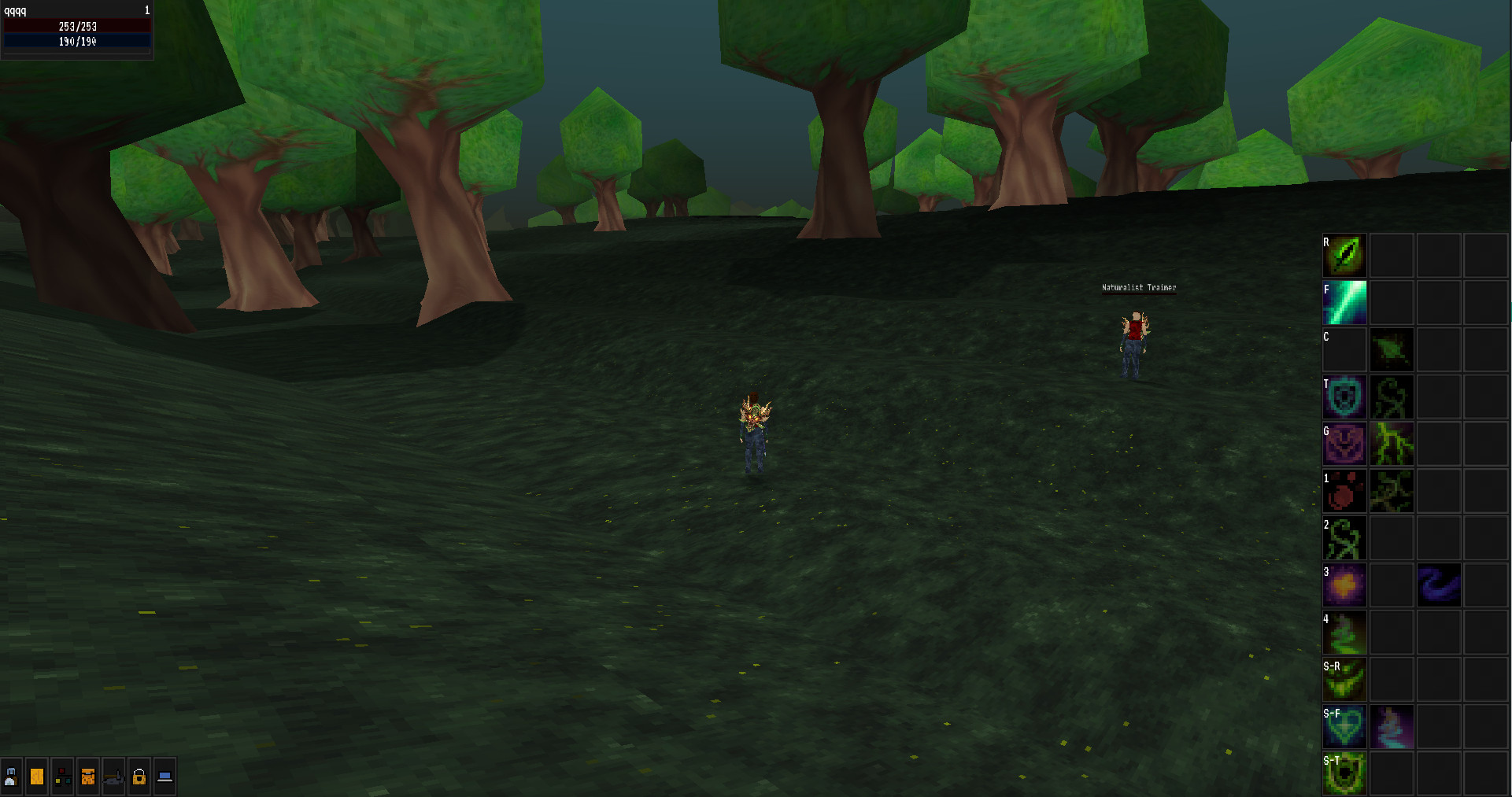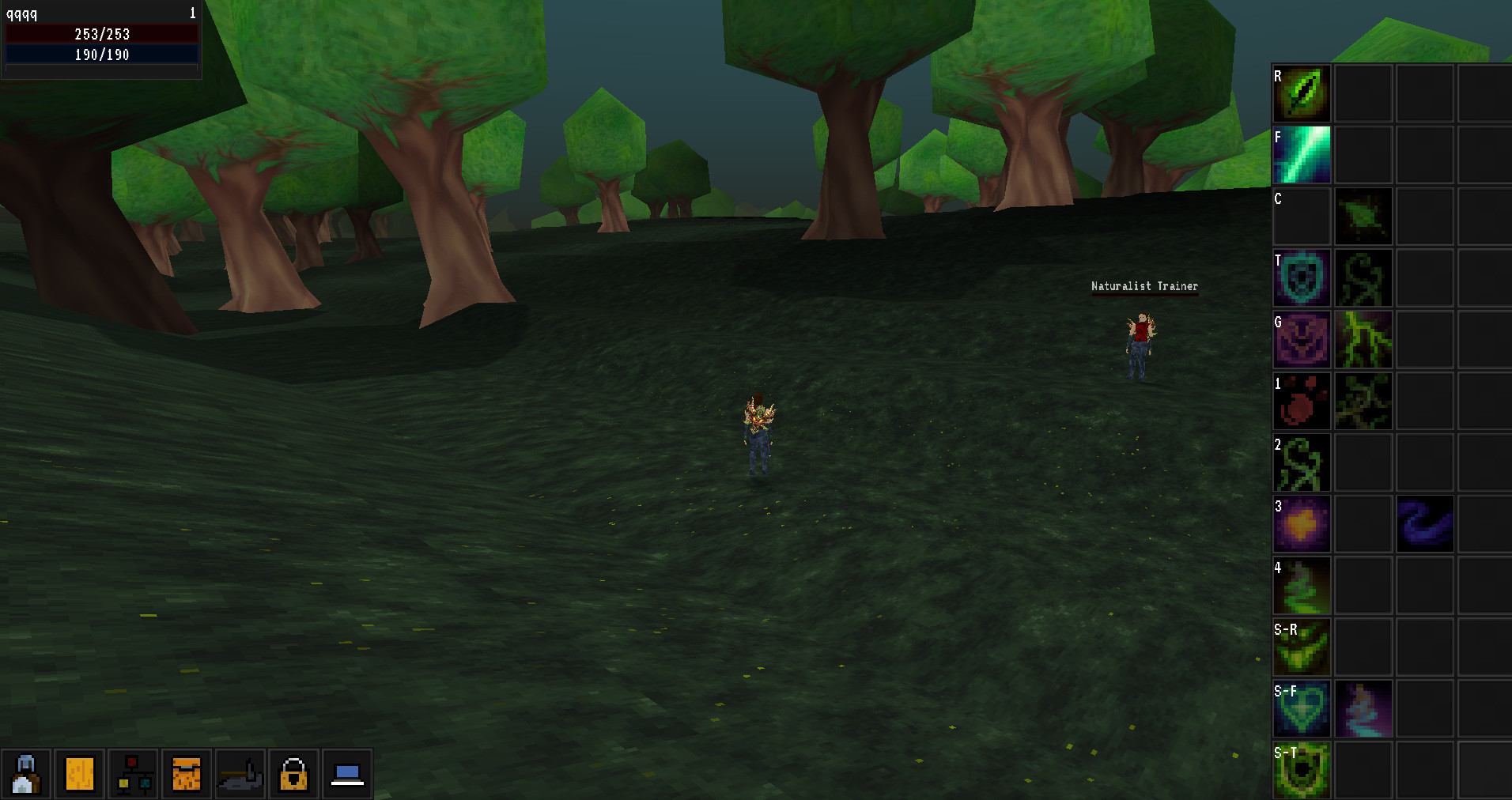| .github | ||
| game | ||
| patches | ||
| pictures | ||
| tools | ||
| .gitignore | ||
| build_ios_release.sh | ||
| build_ios.sh | ||
| build_osx.sh | ||
| build_pi.sh | ||
| build_uwp.bat | ||
| build.config.example | ||
| editor.bat | ||
| editor.sh | ||
| export_all.sh | ||
| ged.sh | ||
| HEADS | ||
| LICENSE | ||
| make_release.sh | ||
| Makefile | ||
| module_config.py | ||
| play.sh | ||
| podman_build_all.sh | ||
| README.md | ||
| SConstruct | ||
Broken Seals
A 3D third person RPG. With both multiplayer, and singleplayer capabilities.
The main gameplay-loop goal is to create an experience with enough complexity and depth, that can rival the more old-school MMO- and action rpgs, because nowadays I feel like that is something that got lost.
I want the game to run on every platform, but the game design is PC first. From the testing I've done this is not going to be an issue.
The project uses a custom version of the - 3.x branch.
On Desktop
On Touchscreens
Project overview
As stated in the opening section the project uses a custom version of the godot engine.
The project's workflow has been set up so you can easily compile this version for yourself if you want to. See the Compiling section if you want to know how to do this.
Engine
Currently I use my fork of godot as a base for the engine (3.x). This contains a port of TokageItLab's SkeletonEditor pr (https://github.com/godotengine/godot/pull/45699). The original godot source will likely work too if you want that for some reason.
Also the engine needs to have some engine modules built in. For example:
Except for a few scripts, entities, spells and auras are handled by the entity_spell_system module c++ side.
Threading is handled by ThreadPool.
The terrain is handled by Terraman.
Most of the models are imported as MeshDataResources, these are meshes that are meant to be merged. These come from the MeshDataResource module. Currently I'm working on the mesh_data_resource_editor addon that will enable these to be edited directly inside the editor.
Actually here's the full list.
Game
The /game folder contains the game's code and assets. This is the folder you are supposed to open in the editor.
The game's folder structure should be mostly self explanatory.
Game Modules
Except for probably the game modules.
I designed the game's code to be highly modular, so I created a loader module. It will look for files named game_module.tres and call methods on them on certain events.
This system uses the DataManager singleton.
For example this is how the ui initializes itself. The player's body script, requests the instantiated ui from the DataManager singleton like var ui = DataManager.request_instance(DataManager.PLAYER_UI_INSTANCE).
And the data manager will instance it's player ui scene, and call all module's on_request_instance methods.
These module scripts are also responsible for collecting all spells and then setting them into the ESS singleton, so they are castable. For exmaple the module for the naturalist, and it's resource db, which will be merged into a central resource db for ESS.
Note that the module resources are sorted by their resource paths, so spells should always get the same id, on every platform every time. This is to optimize networkd spell casts.
Most of the game assets ended up under the modules folder here for this reason, however these might get moved, if I find a better arrangement.
Terrain generation
The terrain generation is now handled by the new world_generator addon.
The idea right now is that the terrain is only going to be pseudo-random, as generating proper connected worlds are kind of super difficult, especially if you also have to mesh them in 3d. I think this solution can be extended later to be able to do a full continent / world randomization / generation. However for now the idea is that we have a World resource, this contains Continents, those zontain Zones, and those contain SubZones. The position and size is predetermined by the creator. And then when a chunk needs to be generated it gets put into this world, and setup.
World does mostly nothing on it's own for now, except for holding continents. Right continents should handle things like oceans, and big mountains. Zones generate proper terrain, and add props. They need to blend into continents. SubZones can be used as spawners, prop spawners, or they can even do terrain mods.
The editor contains an addon to help with editing the world.
Editing the game
Grab an engine with the required modules and then open the project inside the game folder.
After the initial import it might need an editor restart, however everything should work after that.
If you want to use master, you will likely need to build the editor for it if the c++ side had breaking changes since the last release.
Compiling
First make sure, that you have everything installed to be able to compile the godot engine. See: See the official docs for compiling Godot for more info. My setup/compile script uses the same tools, so you don't need to install anything else.
Now let's clone this repository:
git clone https://github.com/Relintai/broken_seals
cd into the new folder:
cd broken_seals
Now let's run the project's setup script, by calling scons without arguments.
scons
This will clone and setup the engine, and all of the required modules into a new engine folder inside the project, using http.
(If you want to use the github's ssh links append repository_type=ssh like scons repository_type=ssh)
Once it is done you can compile the engine.
To build the editor on windows with 4 threads run the following command:
scons bew -j4
To build the editor on linux with 4 threads run the following command:
scons bel -j4
I call this feature of the setup script build words. [See](#Build words).
Once the build finishes you can find the editor executable inside the ./engine/bin/ folder.
For convenience there is a provided editor.sh, or editor.bat for running it from the project's folder.
These will create a copy, so you can even compile while the editor is running.
Alternatively if you don't want to use build words, you can also just go into the engine folder:
cd engine
And compile godot as per the official docs.
Build words
The project's setup script contains support for "build words". These can be used from the root of this project.
For example to build the editor for windows with 4 threads you can use:
scons bew -j4
The first argument must start with b (build), then it needs to be followed by a few abbreviations (the order does not matters)
The rest of the arguments will be passed directly to godot's scons script.
Editor
Append e to build with tools=yes a.k.a. the editor.
scons bew -j4
if you omit e, the system will build the export template for you. For example:
scons bw -j4
This will be the release_debug windows export template.
Platform abbreviations
l: linux
w: windows
a: android
j: Javascript
i: iphone (Not yet finished, use build_ios.sh, and build_ios_release.sh)
Mac OSX: Not yet finished, use build_osx.sh
Target abbreviations
By default the system builds in release_debug.
Append d for debug, or r for release.
scons bewd -j4
build editor windows debug
scons bwr -j4
build windows release (this will build the windows release export template)
Shared modules
Note: This only works on linux!
append s to the build string.
Optionally you can also make the build system only build a target module, by appending one of these:
E: Entity Spell System
T: Texture Packer
V: Voxelman
W: World Generator
P: Procedural Animations
Example:
scons belsE -j4
build editor linux shared (Entity Spell System) with 4 threads
Note: to easily run the editor you can use the editor.sh or editor.bat in the root of the project.
Other
Append v to pass the vsproj=yes parameter to the build script. This will generate Visual Studio project files.
Postfixes
There are a few postfixes for the build words. These are more complex options. You have to append them to your build word with an underscore.
You can use as many as you want.
For example:
scons bel_slim_latomic -j4
slim
With this postfix you can build a slimmed down version of the engine. This disables quite a few unneeded modules.
scons bel_slim -j4
latomic
If you get linker errors while building the game/editor about undefined referenced with atomic related functions you can use this postfix.
It will add the -latomic command line switch to the linker flags.
I ran into this issue while building on a raspberry pi 4 with the x11 platform. It might be related to the recent reworks to threading.
scons bel_latomic -j4
strip
Appends debug_symbols=no to the build command, which will strip the resulting binary from debug symbols.
scons bel_strip -j4
Scons cache, and sdk locations
In order to use scons cache and to tell the build system where some of the required sdks are located you usually have to use environment variables. Most of the time you might just want to add them globally, howewer this is sometimes unfeasible (e.g. you don't have administrator access, or you just want to have multiple sdk versions installed).
In order to solve this a build config file was added.
If you want to use the config simply rename the provided build.config.example to build.config, and customize
the settings inside.
Manual Setup
If you you don't want to use the setup script (or just want to know what it actually does), this section will explain how to set everything up manually.
First clone godot. Either my fork (recommended at the moment):
git clone https://github.com/Relintai/godot.git
or the official 3.x master:
git clone https://github.com/godotengine/godot.git -b 3.x
go into engine's modules fodler.
cd godot/modules/
Now go ahead and get every single required engine module from here.
cd ../../
Now if you look at the HEADS file.
It contains the commit hashes for that particular revision for every module and the engine.
You need to go through them and checkout the proper commits.
Now you can go ahead and compile godot normally.
The required engine modules
These are the required engine modules, they are listed here for completeness`s sake, the project's setup script will install these for you automatically! See the Compiling section.
https://github.com/Relintai/entity_spell_system.git
https://github.com/Relintai/ui_extensions.git
https://github.com/Relintai/texture_packer.git
https://github.com/Relintai/godot_fastnoise.git
https://github.com/Relintai/mesh_data_resource.git
https://github.com/Relintai/props.git
https://github.com/Relintai/mesh_utils.git
https://github.com/Relintai/broken_seals_module.git
https://github.com/Relintai/thread_pool.git
https://github.com/Relintai/terraman.git
Pulling upstream changes
First pull the changes by calling
git pull orgin master
Then just run scons, to will update the modules.
Upgrading the modules
Note: this is how to update the HEADS file. Normally you don't need to do this.
If you want to update the modules, and the engine to the latest, you can use (action=update):
scons a=u
You can also update different targets: all, engine, modules, all_addons, addons, third_party_addons
For example to update the engine to the latest: scons a=u target=engine

